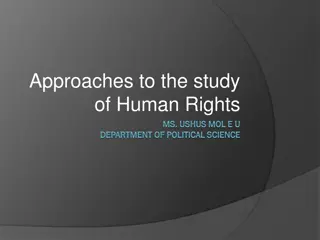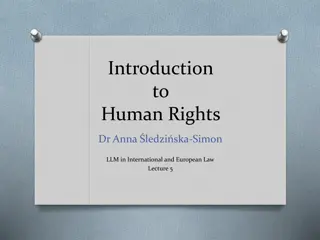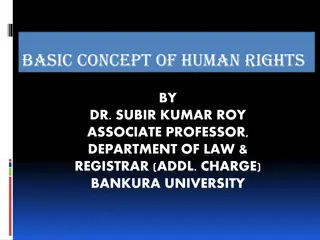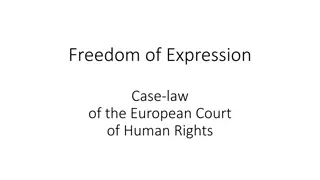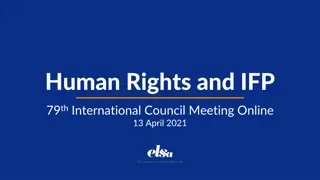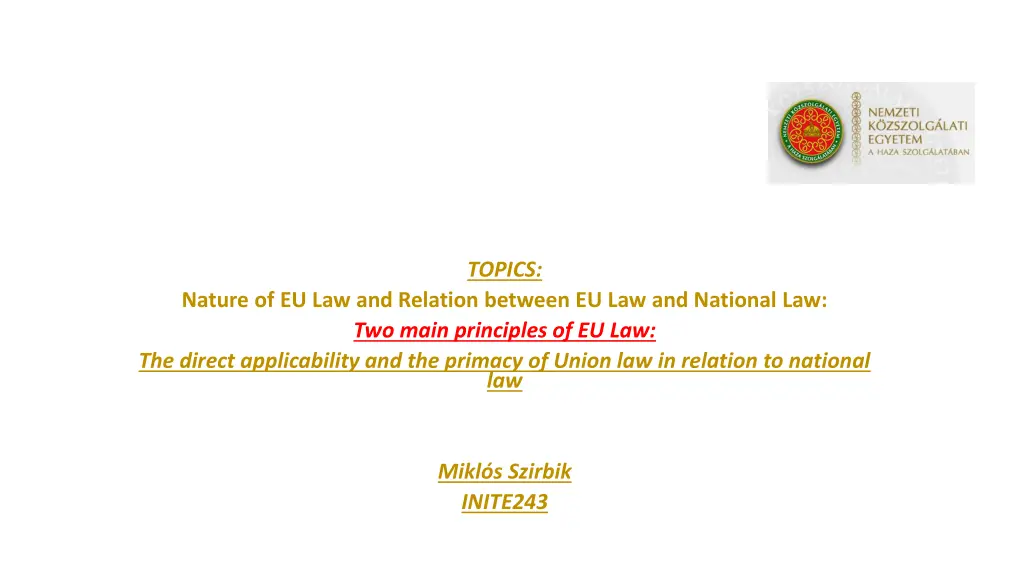
EU Law: Direct Applicability and Primacy of Union Law Explained
Explore the nature of EU law and the relationship between EU law and national law, focusing on the principles of direct applicability and primacy of Union law. Key cases such as Van Gend & Loos and Costa v ENEL are examined to understand the legal framework of the EU and its impact on member states and citizens.
Download Presentation

Please find below an Image/Link to download the presentation.
The content on the website is provided AS IS for your information and personal use only. It may not be sold, licensed, or shared on other websites without obtaining consent from the author. If you encounter any issues during the download, it is possible that the publisher has removed the file from their server.
You are allowed to download the files provided on this website for personal or commercial use, subject to the condition that they are used lawfully. All files are the property of their respective owners.
The content on the website is provided AS IS for your information and personal use only. It may not be sold, licensed, or shared on other websites without obtaining consent from the author.
E N D
Presentation Transcript
TOPICS: Nature of EU Law and Relation between EU Law and National Law: Two main principles of EU Law: The direct applicability and the primacy of Union law in relation to national law Mikl s Szirbik INITE243
NATURE OF EU LAW Any consideration of the legal nature of the EU must start by looking at its characteristic features. Although the EU s legal nature was set out in two precedent- setting judgments of the CJEU in 1963 and 1964 relating to the then EEC, the judgments are still valid for the EU in its current form.
NATURE OF EU LAW Van Gend & Loos Cace : Judgment of the Court of Justice (ECJ) of 5 February 1963. In this legal dispute, the Dutch transport company Van Gend & Loos filed an action against the Netherlands customs authorities for imposing an import duty on a chemical product from Germany which was higher than duties on earlier imports. The company considered this an infringement of Article 12 of the EEC Treaty, which prohibits the introduction of new import duties or any increase in existing customs duties between the Member States. The court in the Netherlands then suspended the proceedings and referred the matter to the CJEU for clarification as regards the scope and legal implications of the abovementioned article of the Treaty establishing the EC.
NATURE OF EU LAW Van Gend & Loos Cace : Judgment of the Court of Justice (ECJ) of 5 February 1963. The Court of Justice used this case as an opportunity to set out a number of observations of a fundamental nature concerning the legal nature of the EEC. In its judgment, the Court stated that: The objective of the EEC Treaty, which is to establish a Common Market, the functioning of which is of direct concern to interested parties in the Community, implies that this Treaty is more than an agreement which merely creates mutual obligations between the contracting States. This view is confirmed by the preamble to the Treaty which refers not only to governments but to peoples. It is also confirmed more specifically by the establishment of institutions endowed with sovereign rights, the exercise of which affects Member States and also their citizens The conclusion to be drawn from this is that the Community constitutes a new legal order of international law for the benefit of which the states have limited their sovereign rights, albeit within limited fields, and the subjects of which comprise not only Member States but also their nationals.
NATURE OF EU LAW Flaminio Costa v E.N.E.L. - Judgment of the Court of Justice of 15 July 1964. The Costa v ENEL case gave the Court of Justice an opportunity to set out its position in more detail. The facts of this case were as follows. In 1962, Italy nationalised the production and distribution of electricity and transferred the assets of the electricity undertakings to the national electricity board, ENEL. As a shareholder of Edison Volta, one of the companies that was nationalised, Mr Costa considered that he had been deprived of his dividend and consequently refused to pay an electricity bill for the amount of ITL 1 926.
NATURE OF EU LAW Flaminio Costa v E.N.E.L. - Judgment of the Court of Justice of 15 July 1964. In proceedings before the arbitration court in Milan, one of the arguments put forward by Mr Costa to justify his conduct was that the nationalising act infringed a number of provisions of the EEC Treaty. In order to be able to assess Mr. Costa s submissions in his defence, the court requested that the CJEU interpret various aspects of the EEC Treaty. In its judgment, the CJEU stated the following in relation to the legal nature of the EEC (see next slide).
NATURE OF EU LAW Flaminio Costa v E.N.E.L. - Judgment of the Court of Justice of 15 July 1964. ECJ findings in the Case: 1. By contrast with ordinary international treaties, the EEC Treaty has created its own legal system which became an integral part of the legal systems of the Member States and which their courts are bound to apply. By creating a Community of unlimited duration, having its own institutions, its own personality, its own legal capacity and capacity of representation on the international plane and, more particularly, real powers stemming from a limitation of sovereignty or a transfer of powers from the States to the Community, the Member States have limited their sovereign rights and have thus created a body of law which binds both their nationals and themselves.
NATURE OF EU LAW Flaminio Costa v E.N.E.L. - Judgment of the Court of Justice of 15 July 1964. ECJ findings in the Case: 2. It follows from all these observations that the law stemming from the Treaty, an independent source of law, could not, because of its special and original nature, be overridden by domestic legal provisions, however framed, without being deprived of its character as Community law and without the legal basis of the Community itself being called into question. The transfer by the States from their domestic legal system to the Community legal system of the rights and obligations arising under the Treaty carries with it a permanent limitation of their sovereign rights, against which a subsequent unilateral act incompatible with the concept of the Community cannot prevail.
NATURE OF EU LAW Results of the judgements Van Gend & Loos and Flaminio Costa v E.N.E.L. In the light of these judgments, the elements which together typically characterise the special legal nature of the EU are: the institutional set-up, which ensures that action by the EU is also characterised by the overall European interest, i.e. is reflected in or influenced by the Union interest as laid down in the objectives; the transfer of powers to the Union institutions to a greater degree than in other international organisations, and extending to areas in which states normally retain their sovereign rights; the establishment of its own legal order, which is independent of the Member States legal orders;
NATURE OF EU LAW Results of the judgements Van Gend & Loos and Flaminio Costa v E.N.E.L. In the light of these judgments, the elements which together typically characterise the special legal nature of the EU are: the direct applicability of Union law, which makes provisions of Union law fully and uniformly applicable in all Member States, and bestows rights and imposes obligations on both the Member States and their citizens; the primacy of Union law, which ensures that Union law may not be revoked or amended by national law and that it takes precedence over national law if the two conflict.
Thank you for your attention! Thank you for your attention!

